Future Job Skills: The Increasing Value of Continued Learning
GetSmarter, a 2U, Inc. brand, recently conducted research which surveyed over 8,000 professionals from 106 countries to gain insight into evolving business challenges and how they’re tackling the need to upskill. The results from this, combined with GetSmarter’s expertise from the past 12 years has provided a deep understanding of the changing nature of work and the role education plays in it.
As drivers such as artificial intelligence (AI) continue to reshape the workplace, it’s become increasingly important for employees to update their skill set in line with new business needs. As a result, professionals have to prioritise learning if they want to stay competitive.
However, as we age, learning isn’t simply about earning degrees or attending celebrated institutions. Books, online courses, development programmes, podcasts, and other resources have never been more accessible to the modern professional. These make it easier to build a habit of lifelong learning that can supplement traditional education and ensure you’re equipped with updated industry skills in the face of constant change.
Are skills-based certificates valuable?
While once-off traditional education such as a degree opens up opportunities, it’s no longer sufficient to sustain a long-term career in the modern age. As both life expectancy is extended and the rate of change in business grows, what you learn at the beginning of your career is likely to become outdated far quicker than ever before.
In a future where the average individual could live up to 115 years, people will work longer as the age of retirement is pushed back.1 When combined with the current changes happening in the workplace, this gives you the time and opportunity to reinvent yourself over and over. However, it also presents a need to learn new skills as your job evolves.
For example: The skills that are most in-demand for marketing managers will either increase or decrease in importance over time as entirely new skills join the list. As can be seen in the image below, in the space of just four years (approximately the time it takes the average student to complete an undergraduate degree) these skills have changed significantly.
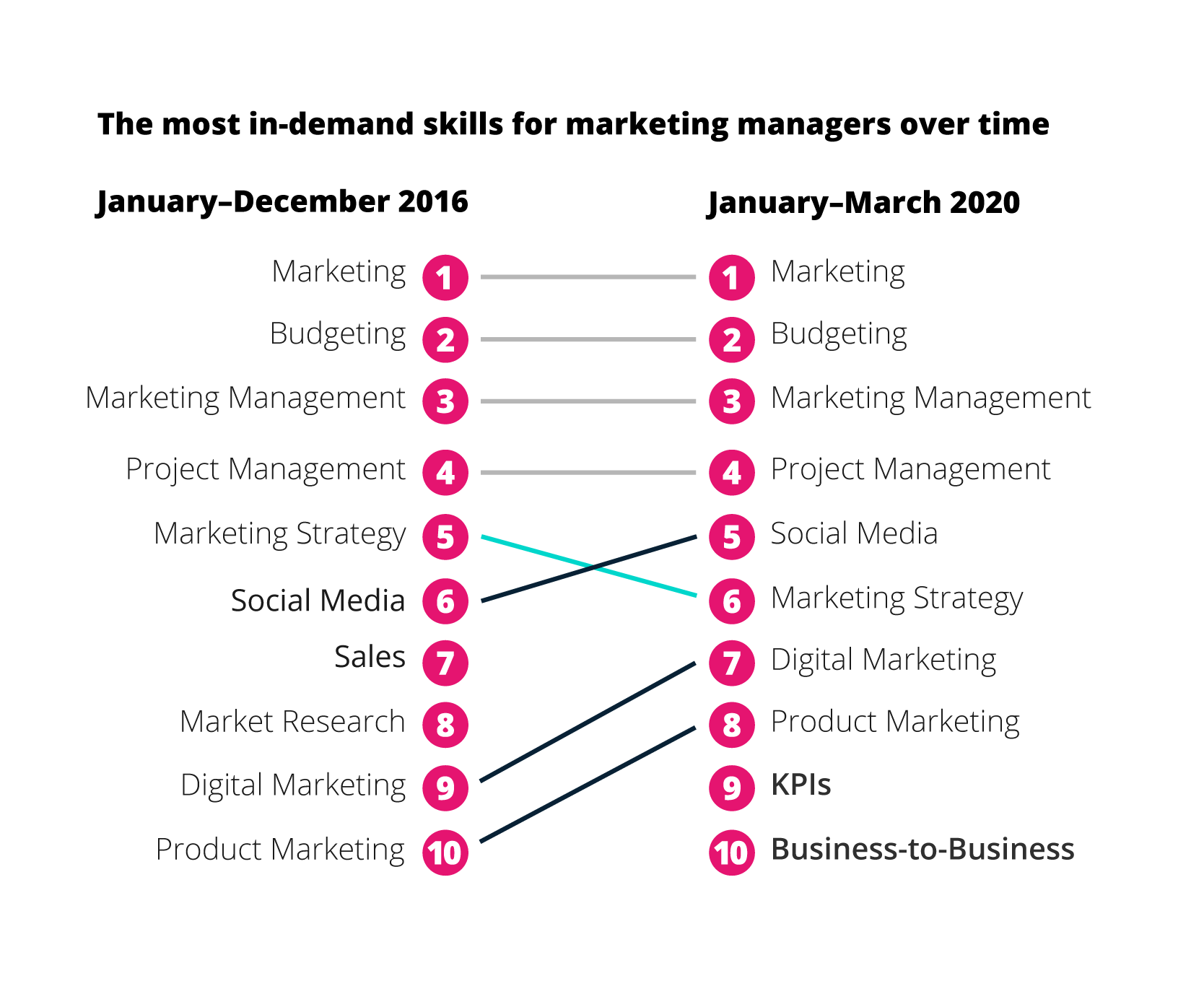
(2019). ‘Occupation analysis – skills explorer™’. Retrieved from Burning Glass Technologies.
To address this, short, frequent iterations of knowledge will help ensure you keep up with the changing demands of your role. That said, on-the-job learning may not be enough to fill knowledge gaps properly either. While micro-learning in the form of industry articles, emails, and tutorials can help you as and when you need it, it can only take you so far. Because the fast rate of change is having such a profound impact on the way we work, you may need to gain an entirely new set of skills as you progress through your career. By complementing micro-learning with instances of macro-learning – such as skills-based certificates – you’re able to take bigger strides in your skills development.
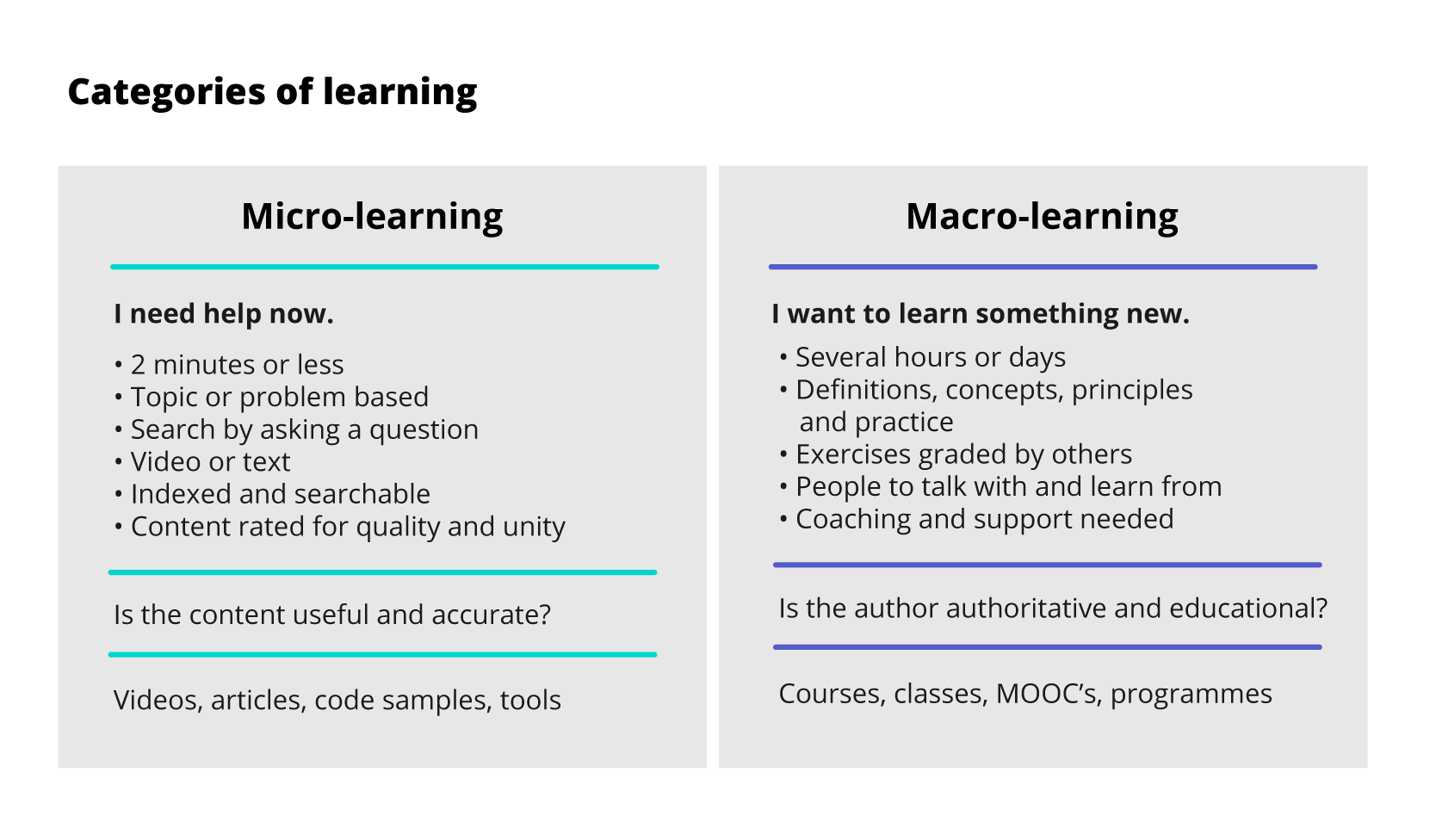
Skills-based certificates serve to grow your professional toolkit and give you a safe platform to test your knowledge.2 They can also set you up for long-term success. In fact, when employees upskill or reskill with a certificate course, they can expect to earn at least 1.5 times more than their non-certificate counterparts.3
No matter where you are in your career, everyone needs to commit to developing their skill set for the future. Explore the GetSmarter Skills Hierarchy for guidance on what skills you should be prioritising, regardless of your industry.
GetSmarter’s research shows that almost 70 per cent of human resource (HR), learning and development (L&D), and talent managers believe that skills-based certificates are currently a valuable signal of capability on a potential candidate’s CV, and 72 per cent believe that this will become increasingly valuable in future.
In fact, the findings reveal that employers actually place greater value on skills-based certificates than on formal degrees or even depth of experience, when considering future candidates. This may be thanks to the growing number of millennials who are becoming managers in hiring positions. Because younger generations are keenly aware of how quickly things are changing and the importance of keeping up to date, skills-based certificates and alternative forms of education are becoming even more widely accepted.
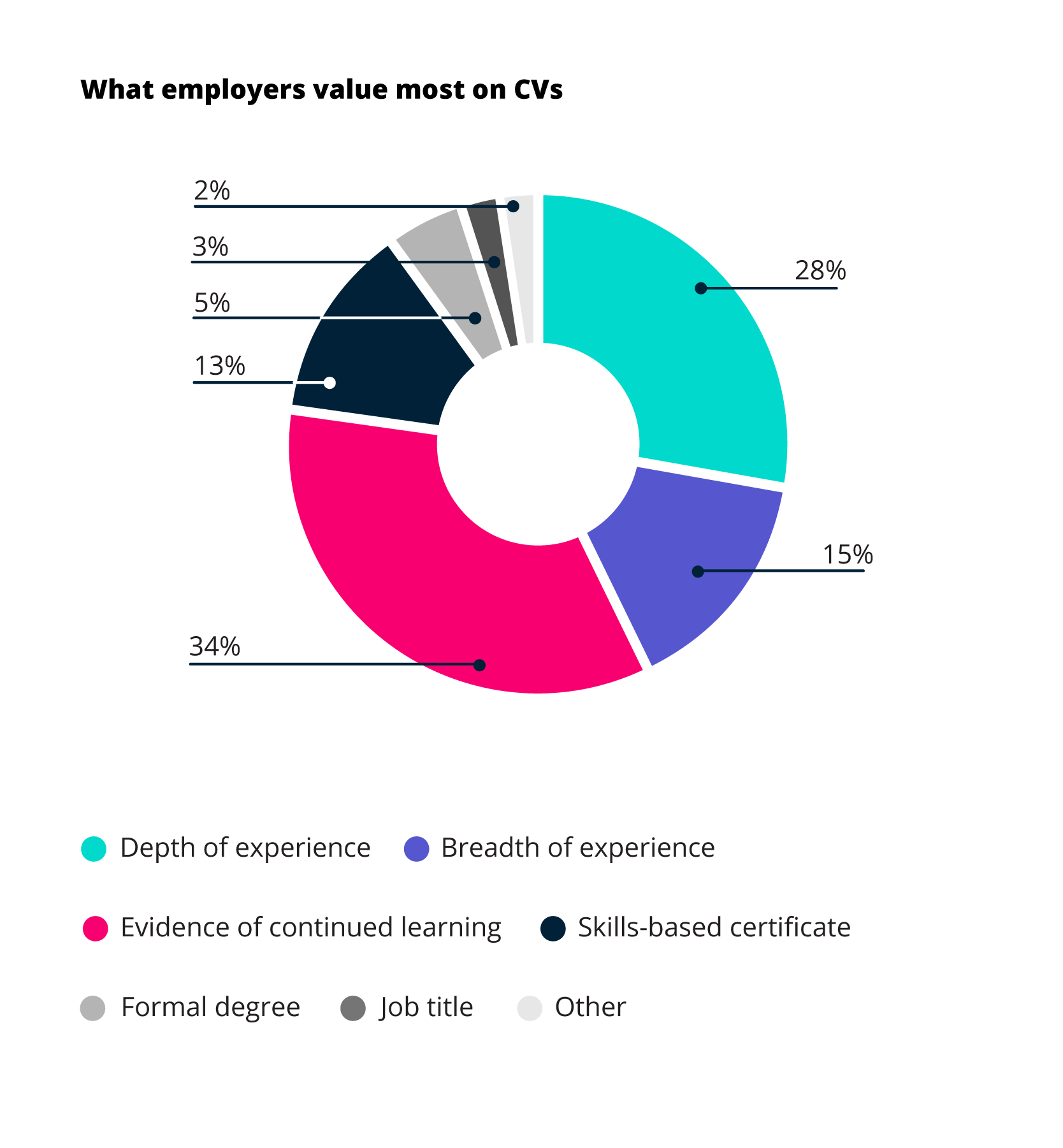
The shift towards continued learning in organisations
Historically, traditional degrees have outweighed any other educational qualification on an individual’s CV. However, as the current working environment evolves, supplementing a degree with continued learning has become increasingly necessary. GetSmarter’s research supports this, with recruiters citing evidence of continued learning as one of the top things they look for in a prospective candidate’s CV.
Aside from future employment opportunities, there’s also a growing shift towards continued learning within organisations as professionals (and their employers) wrestle with the changes brought on by technology and automation.4 In fact, the World Economic Forum’s Future of Jobs Report predicts that on average, employees will need 101 days of retraining and upskilling in the period leading up to 2022.5 This makes sense when you consider that technological innovation could result in up to 375 million occupations changing drastically within the next 10 years alone.6
When looking at respondent’s data through a generational lens, it becomes clear that employees typically focus on gaining skills-based certificates at the start of their careers to accommodate for this. However, a spike in learning can also be seen as professionals move through major milestones. As you progress in your career, or decide to make major career changes, upskilling in areas such as leadership, strategy and analytical thinking becomes increasingly important.
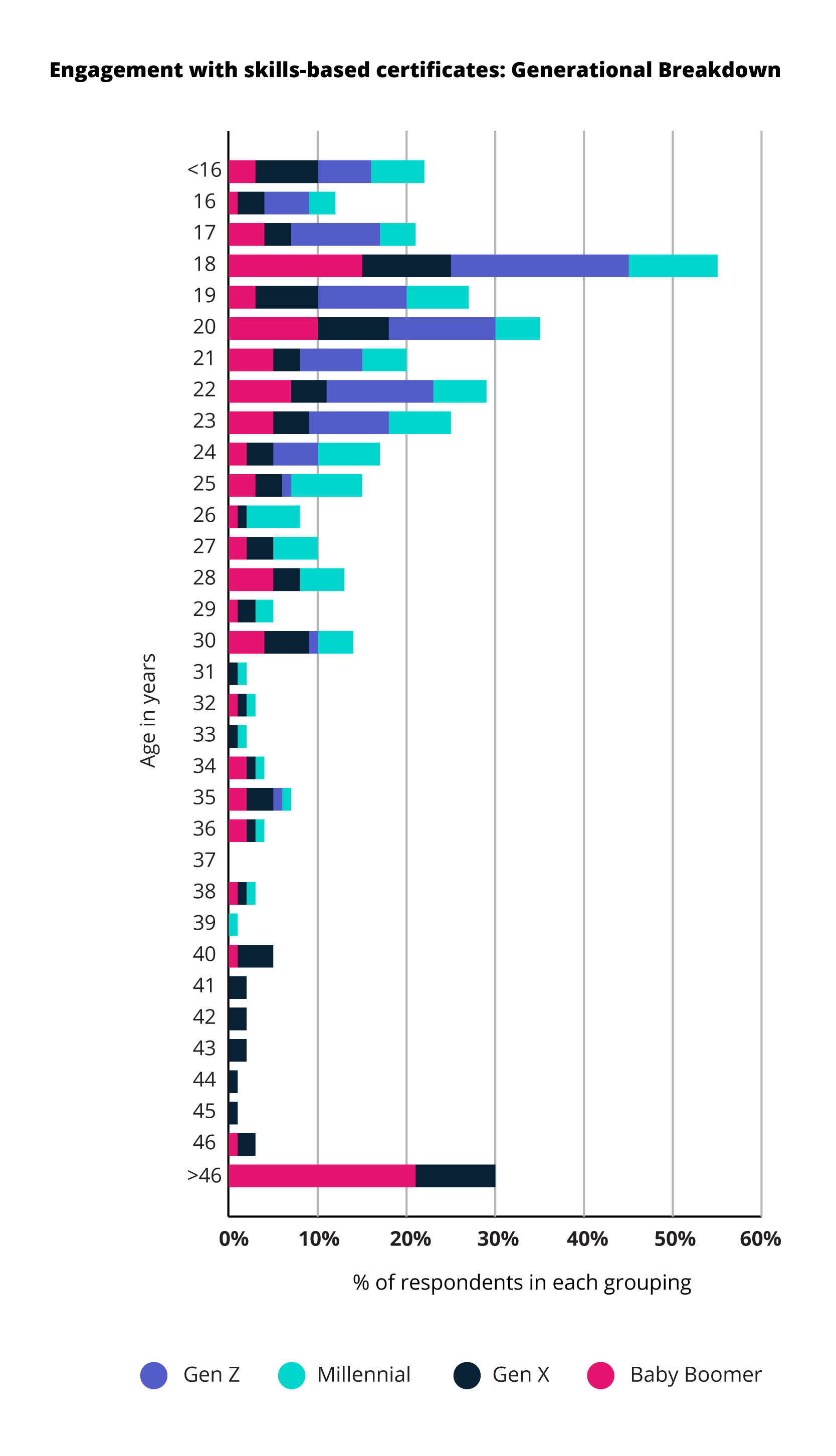
To stay relevant in a complex landscape, professionals have also had to change the way they think about upskilling as a whole. Today, they’re moving away from gaining in-depth knowledge in one area, and towards growing their expertise in multiple areas with additional on-the-job training.7 Lifelong learning, with a goal towards sustained employment, means a departure from the traditional T-shaped, singular expertise profile to the more realistic M-shaped, multiple expertise profile.
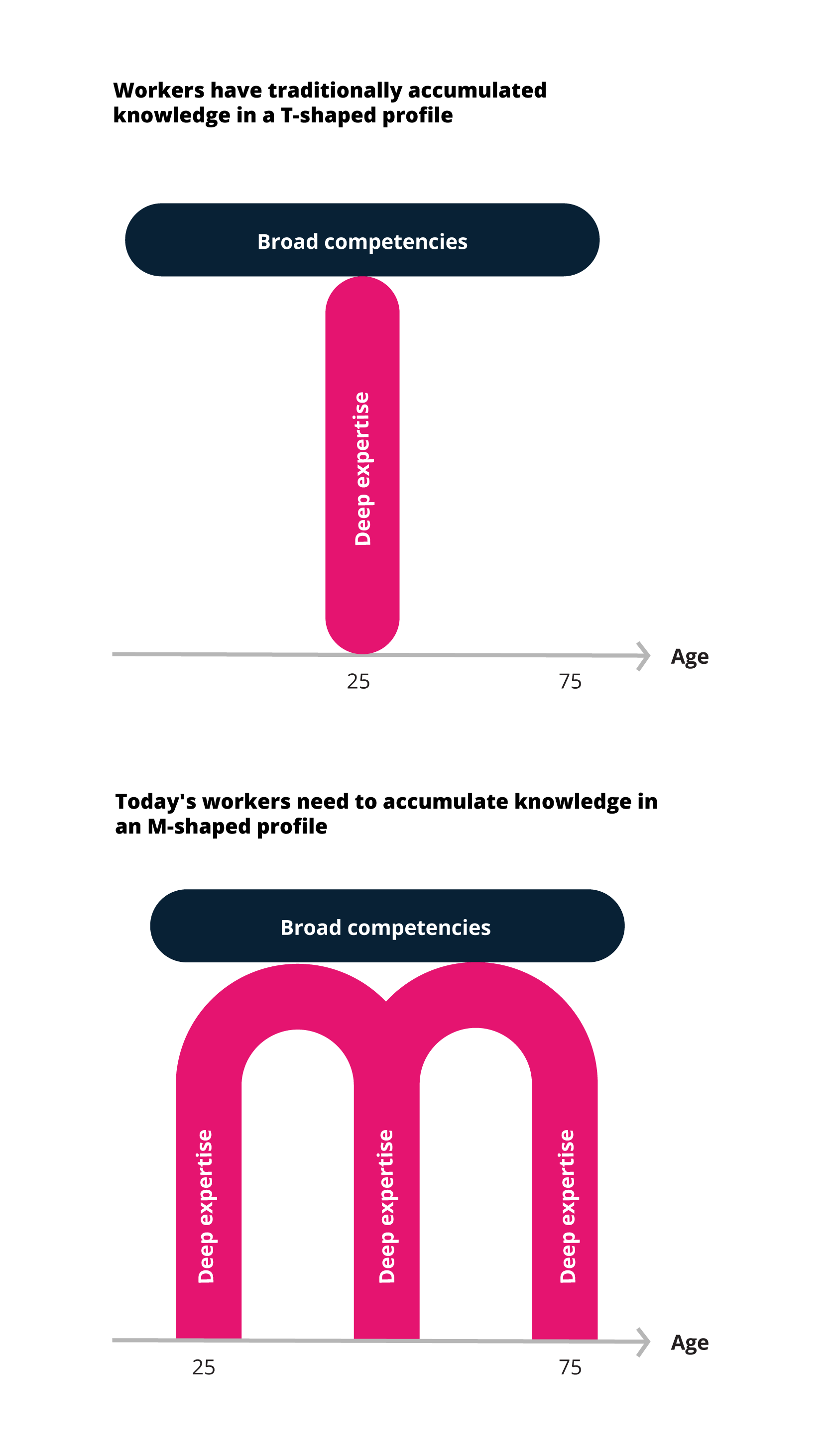
Brassey, J. et al. (Feb, 2019). ‘Seven essential elements of a lifelong-learning mind-set’. Retrieved from McKinsey.
Up-to-date and in-demand skills have become the new currency in the workplace, and the M-shaped profile is the road map that will ensure you remain relevant. Organisations that support this new skills development approach, through providing coursework allowances and suggesting tailored professional development sessions, reap the benefits of inhouse talent with much-needed skills.8
GetSmarter’s research has found that organisations tend to agree on the importance of continuous learning, with 40 per cent of HR, L&D and talent managers, as well as 47 per cent of people managers choosing to upskill their teams to close skill gaps, rather than hiring external talent.
Beyond technical upskilling
While technical expertise is in high demand, GetSmarter’s research found that the majority of employees feel that the biggest skill gap in their organisation isn’t technical, but rather interpersonal. In the future, as technology will become increasingly automated, work will be less about using technology – which requires technical upskilling – and more about interacting with technology – which requires softer skills such as the ability to collaborate effectively. Technical skills will become the means by which to compete, and people skills will become a competitive advantage.
Although some believe that these skills can’t necessarily be taught, the majority of professionals agree that they can in fact be developed by exploring new frameworks, techniques, and communication methods. According to GetSmarter’s findings, 69 per cent of HR, L&D and talent professionals, and 67 per cent of non-HR professionals believe that you can effectively learn interpersonal skills online.
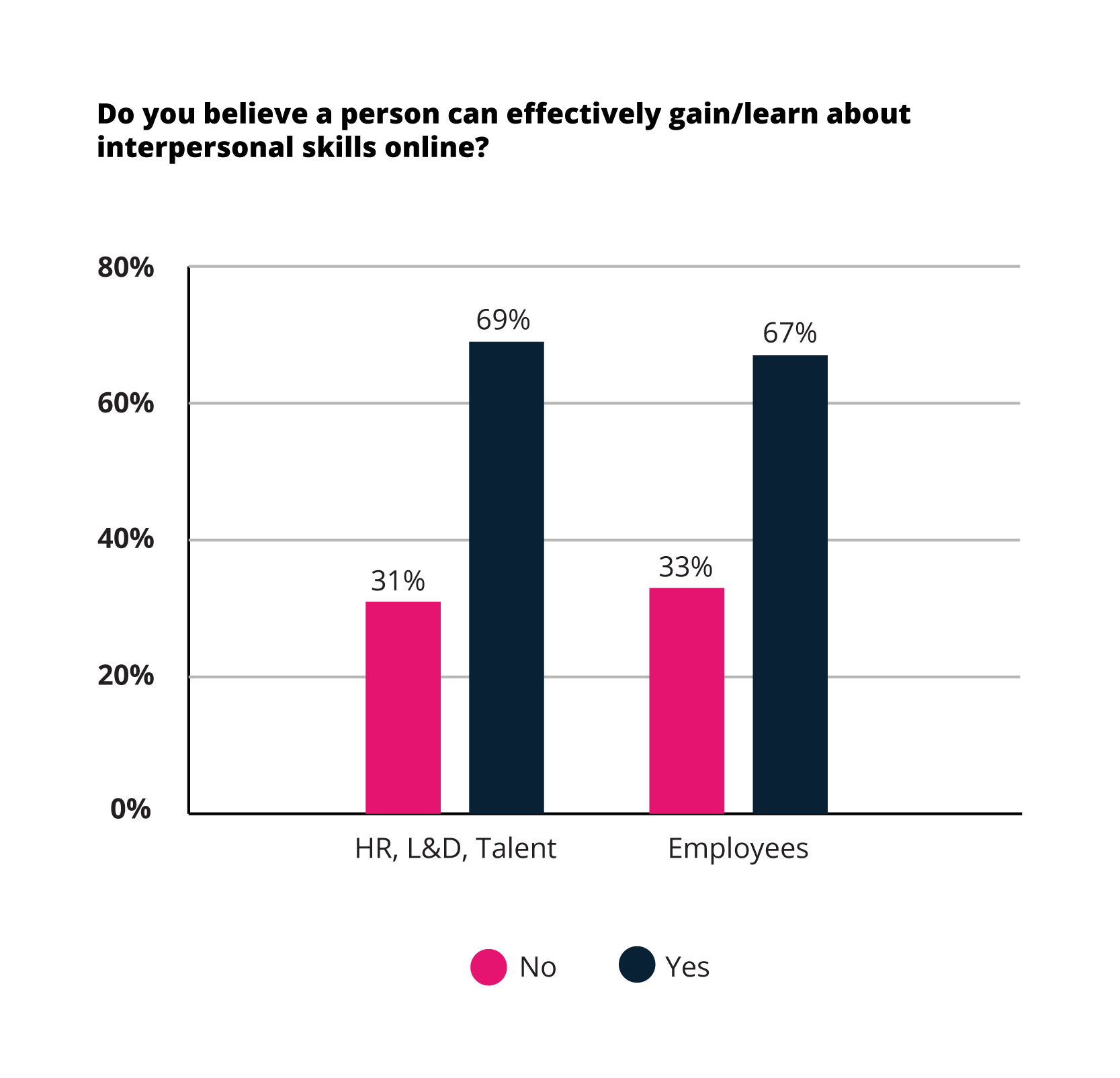
With the value of interpersonal skills increasing in the workplace, and with the majority of hiring decisions likely to be based on a candidate’s ability to exemplify these skills, ascertaining skills-based certificates linked to interpersonal skills and adding them to your CV or LinkedIn profile can be a great way for individuals to signal their commitment to re-skilling and upskilling.
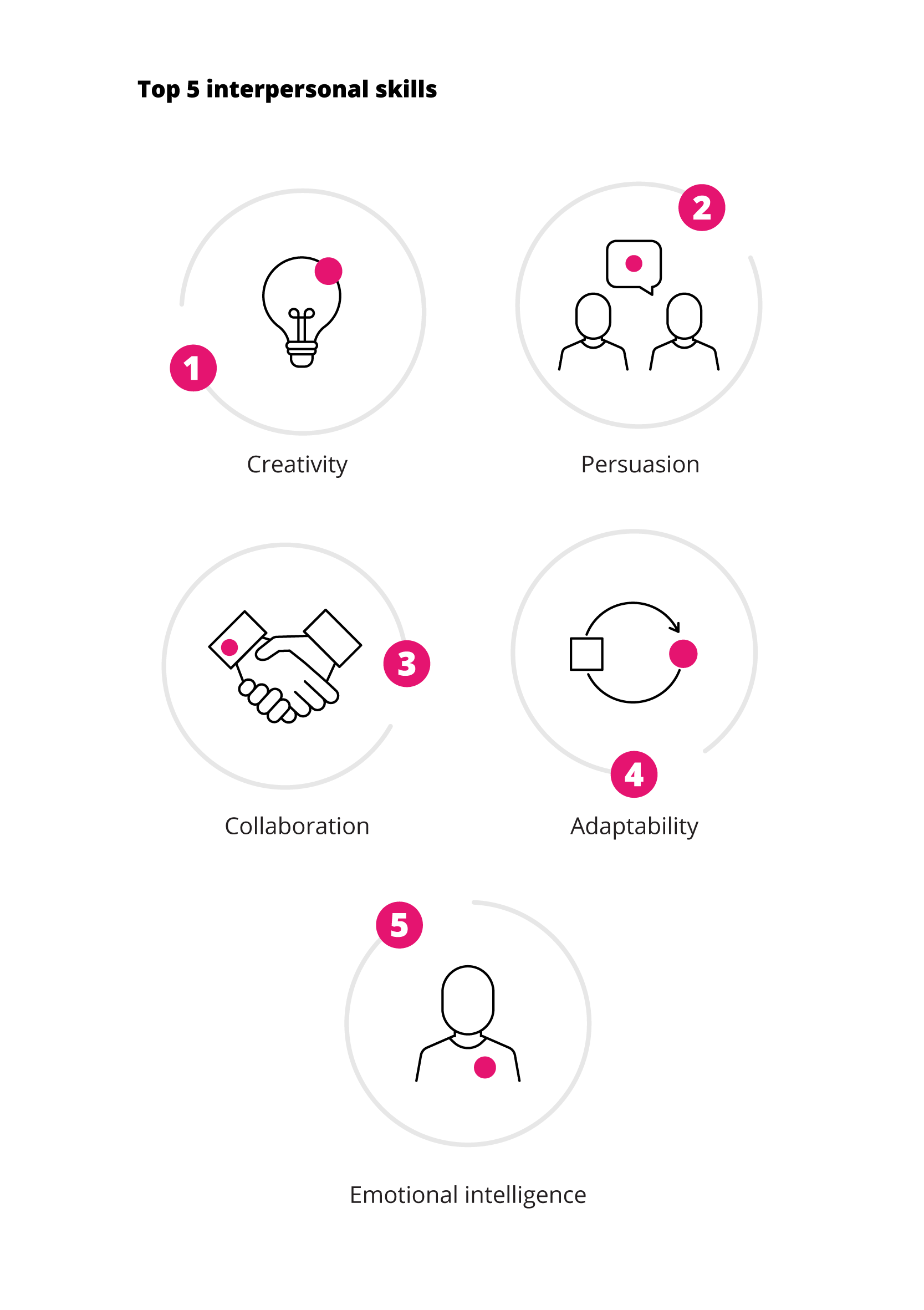
The benefits of continued digital learning
For today’s working professionals, both technical and interpersonal skills can now be learned online. This offers you a number of benefits:
- You can set your own pace, allowing for greater control of the learning experience.9
- Almost every subject and topic is available via online learning, giving you access to in-demand skills despite your location.10
- Retention of information is high, as there are typically more frequent assessments, allowing instructors to assess your challenges and progress accurately.11
- Disruption to your work schedule is minimal as learning can take place over weekends, or when it best suits you.12
- You can interact and discuss points with instructors in real time.13
The future is learning
By prioritising learning, both individuals and organisations can meet the future with confidence. Companies that embrace the global shift towards continuous learning will reap the benefits of up-to-date inhouse talent, and individuals who take it upon themselves to reskill and upskill will find greater employment opportunities become available. As the nature of work changes before our eyes, the only option left is to change and grow with it. Thankfully, we also live in an age where gaining access to learning material is easier than ever before. From skills-based certificates to online tutorials, there are a plethora of resources available to you as you prepare for the future of work.
- 1 Jacobson, B. (Jul, 2019). ‘Will We Live Longer in the Future?’. Retrieved from Future Proof.
- 2 (Sep, 2019). ‘This is how skills-based certifications may support employment for the next generation’. Retrieved from India Today.
- 3 Nietzel, M. (May, 2019). ‘Non-degree certificates and certificates: fast, cheap, and effective’. Retrieved from Forbes.
- 4 Lund, S. (Nov, 2018). ‘Why the workplace needs to be a place of continuous learning’. Retrieved from Forbes.
- 5 (2018). ‘The future of jobs report’.Retrieved from World Economic Forum.
- 6 Illanes, P. et al. (Jan, 2018). ‘Retraining and reskilling workers in the age of automation’. Retrieved from McKinsey.
- 7 Brassey, J. et al. (Feb, 2019). ‘Seven essential elements of a lifelong-learning mind-set’. Retrieved from McKinsey.
- 8 Brassey, J. et al. (Feb, 2019). ‘Seven essential elements of a lifelong-learning mind-set’. Retrieved from McKinsey.
- 9 Busteed, B. (Mar, 2019). ‘Online education: from good to better to best?’. Retrieved from Forbes.
- 10 Baraniuk, C. (Feb, 2019). ‘Inside Finland’s plan to become an artificial intelligence powerhouse’. Retrieved from Wired.
- 11 Busteed, B. (Mar, 2019). ‘Online education: from good to better to best?’. Retrieved from Forbes.
- 12 Busteed, B. (Mar, 2019). ‘Online education: from good to better to best?’. Retrieved from Forbes.
- 13 Busteed, B. (Mar, 2019). ‘Online education: from good to better to best?’. Retrieved from Forbes.